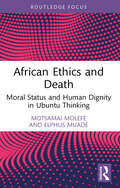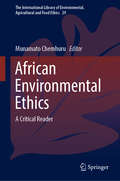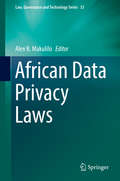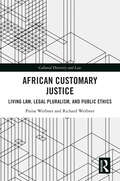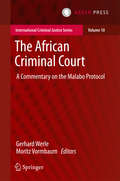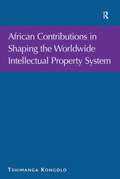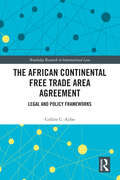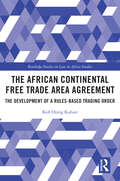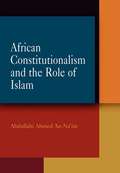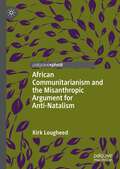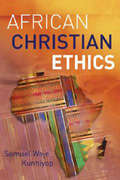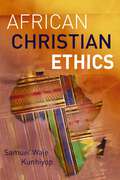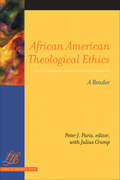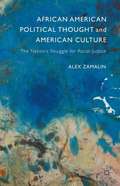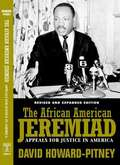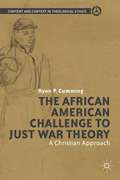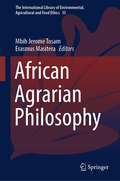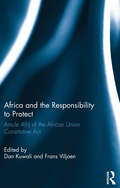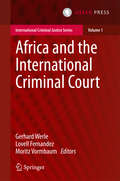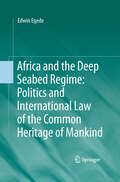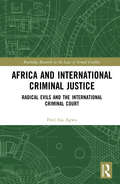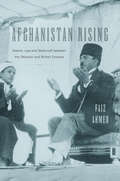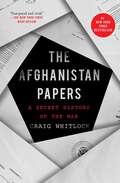- Table View
- List View
African Ethics and Death: Moral Status and Human Dignity in Ubuntu Thinking (Routledge Studies in African Philosophy)
by Motsamai Molefe Elphus MuadeThis book analyzes the concepts of moral status and human dignity in African philosophy and applies them to the moral problems associated with death. The book first challenges the criticism and rejection of moral status in African philosophy and then continues to consider how moral personhood is defined in African ethical theories, investigating which entities have full moral status or moral personhood and are therefore worthy of full ethical consideration. It then applies this theory to the problems associated with death. In the medical context, will an African theory of moral status permit or forbid euthanasia? Do we have moral obligations towards dead human bodies? Overall, the book provides an important African axiological contribution to debates on global ethics and moral philosophy. Providing an important overview of the ethical problems associated with the biological fact of death, this book will be of interest to researchers across the fields of philosophy and African studies.
African Environmental Ethics: A Critical Reader (The International Library of Environmental, Agricultural and Food Ethics #29)
by Munamato ChemhuruThis book focuses on under-explored and often neglected issues in contemporary African environmental philosophy and ethics. Critical issues such as the moral status of nature, African conceptions of animal moral status and rights, African conceptions of environmental justice, African relational Environmentalism, ubuntu, African theocentric and teleological environmentalism are addressed in this book. It is unique in so far as it goes beyond the generalized focus on African metaphysics and African ethics by exploring how these views might be understood differently in order to conceptualize African environmental ethics. Against the background where environmental problems such as pollution, climate change, extinction of flora and fauna, and global warming are plain to see, it becomes useful to examine how African conceptions of environmental ethics could be understood in order to confront some of these problems facing the whole world. This book will be of value to undergraduate students, graduate students and academics working in the area of African Philosophy, African Environmental Ethics and Global Ethics in general.
African Data Privacy Laws (Law, Governance and Technology Series #33)
by Alex B. MakuliloThis volume presents analyses of data protection systems and of 26 jurisdictions with data protection legislation in Africa, as well as additional selected countries without comprehensive data protection laws. In addition, it covers all sub-regional and regional data privacy policies in Africa. Apart from analysing data protection law, the book focuses on the socio-economic contexts, political settings and legal culture in which such laws developed and operate. It bases its analyses on the African legal culture and comparative international data privacy law. In Africa protection of personal data, the central preoccupation of data privacy laws, is on the policy agenda. The recently adopted African Union Cyber Security and Data Protection Convention 2014, which is the first and currently the only single treaty across the globe to address data protection outside Europe, serves as an illustration of such interest. In addition, there are data protection frameworks at sub-regional levels for West Africa, East Africa and Southern Africa. Similarly, laws on protection of personal data are increasingly being adopted at national plane. Yet despite these data privacy law reforms there is very little literature about data privacy law in Africa and its recent developments. This book fills that gap.
African Customary Justice: Living Law, Legal Pluralism, and Public Ethics (Cultural Diversity and Law)
by Pnina Werbner Richard WerbnerThis book presents an important ethnographic and theoretical advance in legal anthropological scholarship by interrogating customary law, customary courts and legal pluralism in sub-Saharan Africa. It highlights the vitality and continued relevance of customary justice at a time when customary courts have waned or even disappeared in many postcolonial African nations. Taking Botswana as a casestudy from in-depth fieldwork over a fifty-year period, the book shows, the ‘customary’ is robustly enduring, central to settling interpersonal disputes and constitutive of the local as well as the national public ethics. Customary law continues to be constitutionally protected, authorised by the country’s past as an authentic, viable legacy, from the British colonial period of indirect rule to the postcolonial state’s present development as a highly bureaucratised democracy. Along with a theoretical overview of the underlying issues for the anthropology and sociology of law, the book documents customary law as living law in the context of legal pluralism. It takes a legal realist approach and highlights the need to pay close attention to the lived experience of justice and its role in the production of legal subjectivities. The book will be valuable to Africanists but also, more broadly, to social scientists, social historians and socio-legal scholars with interests in law and social change, public ethics and personal morality, and the intersection of politics and judicial decision making.
The African Criminal Court
by Gerhard Werle Moritz VormbaumThis book examines the mutual recognition of judicial decisions in European criminal law as a cornerstone of judicial co-operation in criminal matters in the European Union. Providing comprehensive content and combining theoretical and practical aspects, it covers all of the major issues surrounding mutual recognition. The book analyses its definition, genesis, principles, case law, implementation and evaluation. Special attention is given to mutual recognition measures, namely European arrest warrant (i. e. surrender procedure), mutual recognition of custodial sentences, and measures involving deprivation of liberty, mutual recognition of probation measures and alternative sanctions, mutual recognition of financial penalties, mutual recognition of confiscation orders, the European supervision order in pre-trial procedures (i. e. mutual recognition of supervision measures as an alternative to provisional detention), the European investigation order (i. e. free movement of evidence), and the European protection order (i. e. mutual recognition of protection orders). Instead of focusing solely on a criminal law approach, the book also considers the subject from the perspectives of European Union law and International criminal law.
African Contributions in Shaping the Worldwide Intellectual Property System
by Tshimanga KongoloAfrica is playing an increasingly more significant role in the domain of international intellectual property law, and this book underlines the contributions made by African countries as a group to the development of the current international IP system. It examines in detail their breakthrough proposals and initiatives at the WTO, WIPO and WHO with regard to IP and public health; IP and traditional knowledge, traditional cultural expressions and genetic resources; IP and biodiversity; and exceptions and limitations to copyright. Using Botswana, Burundi, Egypt, Ghana, Kenya, Mauritius, Morocco, South Africa and Tunisia as examples, it examines the systems under which these IP subject matters are protected. From a regional perspective, the book also analyses some initiatives taken by ARIPO, OAPI and the African Union to protect traditional knowledge and traditional cultural expressions, especially in relation to protection of the rights of local farming communities and breeders, regulation of access to biological resources, genetically modified organisms and the proposed establishment of the new Pan-African Intellectual Property Organization (PAIPO). Demonstrating how Africa is now an active player on the international IP scene, this book will be invaluable to those interested in intellectual property law, business and commercial law, and African and international law.
The African Continental Free Trade Area Agreement: Legal and Policy Frameworks (Routledge Research in International Law)
by Collins C. AjiboThis book provides a comprehensive assessment of African economic integration through the lens of International Economic Law. The analysis is contextualised within the prevailing regional economic integrations, the WTO and the peculiarity of the AfCFTA.Through legal analysis, bolstered by economic and political dimensions, the book illustrates the complex interplay of diverse factors that shape the AfCFTA. Each chapter presents a separate element of economic integration within the principles of international economic law, with an interdisciplinary approach encompassing legal, economic and political perspectives. Covering topics such as economic integration and multilateralism, market access, exceptions, trade facilitation, rules of origin and non-tariff barriers, the book also discusses trade remedies, dispute settlement, investment, intellectual property and completion policy. Additionally, human rights, corporate social responsibility and sustainable development principles are discussed, alongside small and medium-sized enterprises (SMEs), digital trade and gender in economic integration.The book will be of interest to students, instructors, practitioners and nonpractitioners in this area of international economic law.
The African Continental Free Trade Area Agreement: The Development of a Rules-Based Trading Order (Routledge Studies on Law in Africa)
by Kofi Oteng KufuorIn 2018, the members of the African Union adopted the African Continental Free Trade Area Agreement (AfCFTA). This book examines the AfCFTA, dissecting its key provisions. It stresses the importance of the AfCFTA in the context of increasing episodes of trade protection in Africa, and it theorizes on the role of the treaty organs. The book also examines the importance of citizen participation for the success of the AfCFTA, as well as exploring the role sub-state actors can play. Ultimately, the study adds to the understanding of the array of problems that are associated with regional trade in Africa and the role law plays in resolving these problems. It will be of importance to academics and students of international law, especially those with an interest in African trade law, as well as legal professionals and policymakers.
African Constitutionalism and the Role of Islam
by Abdullahi Ahmed An-Na'imConstitutionalism is steadily becoming the prevalent form of governance in Africa. But how does constitutionalism deal with the lingering effects of colonialism? And how does constitutional law deal with Islamic principles in the region? African Constitutionalism and the Role of Islam seeks to answer these questions. Constitutional governance has not been, nor will be, easily achieved, Abdullahi Ahmed An-Na'im argues. But setbacks and difficulties are to be expected in the process of adaptation and indigenization of an essentially alien concept--that of of nation-state--and its role in large-scale political and social organization.An-Na'im discusses the problems of implementing constitutionalized forms of government specific to Africa, from definitional to conceptual and practical issues. The role of Islam in these endeavors is open to challenge and reformulation, and should not be taken for granted or assumed to be necessarily negative or positive, An-Na'im asserts, and he emphasizes the role of the agency of Muslims in the process of adapting constitutionalism to the values and practices of their own societies. By examining the incremental successes that some African nations have already achieved and An-Na'im reveals the contingent role that Islam has to play in this process. Ultimately, these issues will determine the long-term sustainability of constitutionalism in Africa.
African Communitarianism and the Misanthropic Argument for Anti-Natalism
by Kirk LougheedAnti-natalism is the provocative view that it is either always or almost always all-things-considered wrong to procreate. Philanthropic anti-natalist arguments say that procreation is always impermissible because of the harm done to individuals who are brought into existence. Misanthropic arguments, on the other hand, hold that procreation is usually impermissible given the harm that individuals will do once brought into existence. The main purpose of this short monograph is to demonstrate that David Benatar’s misanthropic argument for anti-natalism ought to be endorsed by any version of African Communitarianism. Not only that, but there are also resources in the African philosophical tradition that offer unique support for the argument. Given the emphasis that indigenous African worldviews place on the importance of procreation and the immediate family unit this result is highly surprising. This book marks the first attempt to bring anti-natalism into conversation with contemporary African ethics.
African Christian Ethics
by Samuel Waje KunhiyopThis is an introduction to African Christian Ethics for Christian colleges and Bible schools. The book is divided into two parts. The first part deals with the theory of ethics, while the second discusses practical issues. The issues are grouped into the following six sections: Socio-Political Issues, Financial Issues, Marriage Issues, Sexual Issues, Medical Issues, and Religious Issues. Each section begins with a brief general introduction, followed by the chapters dealing with specific issues in that area. Each chapter begins with an introduction, discusses traditional African thinking on the issue, presents an analysis of relevant biblical material, and concludes with some recommendations. There are questions at the end of each chapter for discussion or personal reflection, often asking students to reflect on how the discussion in the chapter applies to their ministry situation.
African Christian Ethics (Hippo Ser.)
by Samuel Waje KunhiyopThis is an introduction to African Christian ethics for Christian colleges and Bible schools. The book is divided into two parts. The first part deals with the theory of ethics, while the second discusses practical issues. The issues are grouped into the following six sections: Socio-Political Issues, Financial Issues, Marriage Issues, Sexual Issues, Medical Issues, and Religious Issues. Each section begins with a brief general introduction, followed by the chapters dealing with specific issues in that area. Each chapter begins with an introduction, discusses traditional African thinking on the issue, presents an analysis of relevant biblical material, and concludes with some recommendations. There are questions at the end of each chapter for discussion or personal reflection, often asking students to reflect on how the discussion in the chapter applies to their ministry situation.
The African Canadian Legal Odyssey
by Barrington WalkerThe African Canadian Legal Odyssey explores the history of African Canadians and the law from the era of slavery until the early twenty-first century. ;This collection demonstrates that the social history of Blacks in Canada has always been inextricably bound to questi52.99ons of law, and that the role of the law in shaping Black life was often ambiguous and shifted over time.Comprised of eleven engaging chapters, organized both thematically and chronologically, it includes a substantive introduction that provides a synthesis and overview of this complex history. This outstanding collection will appeal to both advanced specialists and undergraduate students and makes an important contribution to an emerging field of scholarly inquiry.
African American Theological Ethics: A Reader
by Peter J. Paris Editor Julius CrumpThis volume in the Library of Theological Ethics series draws on writings from the early nineteenth through the late twentieth centuries to explore the intersection of black experience and Christian faith throughout the history of the United States. The first sections follow the many dimensions of the African American struggle with racism in this country: struggles against theories of white supremacy, against chattel slavery, and against racial segregation and discrimination. The latter sections turn to the black Christian vision of human flourishing, drawing on perspectives from the arts, religion, philosophy, ethics, and theology. It introduces students to major voices from African American Christianity, including Frederick Douglass, Richard Allen, W. E. B. DuBois, Marcus Garvey, Martin Luther King Jr., Bayard Rustin, Barbara Jordan, James H. Cone, and Jacqueline Grant. This is the essential resource for anyone who wishes to understand the role that Christian faith has played in the African American struggle for a more just society.
African American Political Thought and American Culture: The Nation's Struggle For Racial Justice
by Alex ZamalinThis book demonstrates how certain African American writers radically re-envisioned core American ideals in order to make them serviceable for racial justice. Each writer's unprecedented reconstruction of key American values has the potential to energize American citizenship today.
The African American Jeremiad: Appeals for Justice in America (Revised and Expanded Edition)
by David Howard-PitneyBegun by Puritans, the American jeremiad, a rhetoric that expresses indignation and urges social change, has produced passionate and persuasive essays and speeches throughout the nation's history. Showing that black leaders have employed this verbal tradition of protest and social prophecy in a way that is specifically African American, David Howard-Pitney examines the jeremiads of Frederick Douglass, Booker T. Washington, Ida B. Wells, W. E. B. DuBois, Mary McLeod Bethune, Martin Luther King, Jr. , and Malcolm X, as well as more contemporary figures such as Jesse Jackson and Alan Keyes. This revised and expanded edition demonstrates that the African American jeremiad is still vibrant, serving as a barometer of faith in America's perfectibility and hope for social justice. This new edition features: * A new chapter on Malcolm X * An updated discussion of Jesse Jackson * A new discussion of Alan Keyes
The African American Challenge to Just War Theory
by Ryan P. CummingIn this innovative treatment of the ethics of war, Ryan P. Cumming brings classical sources of just war theory into conversation with African American voices. The result is a new direction in just war thought that challenges dominant interpretations of just war theory by looking to the perspectives of those on the underside of history and politics.
African Agrarian Philosophy (The International Library of Environmental, Agricultural and Food Ethics #35)
by Mbih Jerome Tosam Erasmus MasiteraThis book critically explores indigenous sub-Saharan African agrarian thought. Indigenous African agrarian philosophy is an uncharted and largely overlooked area of study in the burgeoning fields of African philosophy and philosophy of nature. The book shows that wherever human beings have lived, they have been preoccupied with exploring ways to ensure the sustainable management of limited resources at their disposal, to attain to their basic needs: food, shelter, and security. The book also shows that agriculture and the way people relate with nature are an essential, but generally neglected, determinant of the emergence and orientation of all philosophical traditions. In traditional, pre-colonial African culture, it was difficult to separate agriculture from African relational ontology. Agriculture and the use of natural resources were at the centre of community life and influenced the social, political, economic, and spiritual worldviews of the people. In their contact with nature through agriculture, different beliefs, knowledge systems, norms, moral outlooks, cultural practices and institutions emerged and have been valorized to guide societies on how to sustainably manage the environment. As a way of life, then, agriculture was deeply connected with indigenous beliefs, values, and practices which transcended a wide range of issues related to ecological ethics, food ethics, religion, traditional medicine, political economy, social organisation, biological reproduction and species survival, indigenous knowledge, and property rights. This book will thus be a valuable resource for policy makers and researchers in diverse fields such as philosophy, geography, sociology, anthropology, and development studies.
Africa and the Responsibility to Protect: Article 4(h) of the African Union Constitutive Act
by Dan Kuwali Frans ViljoenSituations of serious or massive violations of human rights are no longer purely of domestic concern, and sovereignty can no longer be an absolute shield for repressive governments in such circumstances. Based on this realization, the international community has recognized a responsibility to protect individuals in states where their governments are unable or unwilling to provide protection against the most serious violations. However, so far, only one intergovernmental organization, the African Union (AU), has explicitly made the right to intervene in a Member State part of its foundational text in Article 4(h) of its Constitutive Act. Although there have been cases of Article 4(h)-type interventions in Africa, the AU Assembly has not yet invoked Article 4(h) explicitly. This book brings together experts in the field to explore the potential application of Article 4(h), and the complexities that may explain its non-invocation so far. Although Article 4(h) is noble in purpose, its implementation faces several legal and policy challenges given that the use of force penetrates the principles of state sovereignty and non-intervention – the very cornerstones upon which the AU is founded. This book considers these issues, as well as the need to reconcile Article 4(h), in so far as it allows the AU to exercise military intervention to protect populations at risk of mass atrocities, with the provisions of the Charter of the United Nations. Drawing from the insights of law, political science, diplomacy and military strategy, the book offers a unique combination of multi-disciplinary expertise that harnesses the views of a diverse group of authors, focused on the legal, policy, and practical insights on the implementation of Article 4(h) and the responsibility to protect in Africa in order to provide concrete recommendations on how to end mass atrocities on the continent
Africa and the International Criminal Court (International Criminal Justice Series #1)
by Gerhard Werle Lovell Fernandez Moritz VormbaumThe book deals with the controversial relationship between African states, represented by the African Union, and the International Criminal Court. This relationship started promisingly but has been in crisis in recent years. The overarching aim of the book is to analyze and discuss the achievements and shortcomings of interventions in Africa by the International Criminal Court as well as to develop proposals for cooperation between international courts, domestic courts outside Africa and courts within Africa. For this purpose, the book compiles contributions by practitioners of the International Criminal Court and by role players of the judiciary of African countries as well as by academic experts.
Africa and the ICC
by Clarke Kamari M. Knottnerus Abel S. De Volder EefjeAfrica and the ICC: Realities and Perceptions comprises contributions from prominent scholars of different disciplines including international law, political science, cultural anthropology, African history and media studies. This unique collection provides the reader with detailed insights into the interaction between the African Union and the International Criminal Court (ICC), but also looks further at the impact of the ICC at a societal level in African states and examines other justice mechanisms on a local and regional level in these countries. This investigation of the ICC's complicated relationship with Africa allows the reader to see that perceptions of justice are multilayered.
Africa and the Deep Seabed Regime: Politics And International Law Of The Common Heritage Of Mankind
by Edwin EgedeThis book seeks to fill a gap in the existing literature by examining the role of African States in the development and establishment of the regime of the deep seabed beyond national jurisdiction (the Area) and the concept of the Common Heritage of Mankind.
Africa and International Criminal Justice: Radical Evils and the International Criminal Court (Routledge Research in the Law of Armed Conflict)
by Fred Aja AgwuThis book provides an overview of crimes under international law, radical evils, in a number of African states. This overview informs a critical analysis of the debates surrounding the African Union’s call for withdrawal from the International Criminal Court and proposes a way forward with a more pertinent role for the Court. The work critically analyzes the arguments around withdrawal from the ICC and the extension of the jurisdiction of the African Court into criminal matters. It is held that this was not intended in the spirit of complementarity as envisaged by the Rome Statute, and is subject to political calculation and manipulation by national governments. Recasting the ICC as a court of second instance would provide a stronger institutional and jurisdictional regime. The book will be a valuable resource for students, academics, and policymakers working in the areas of international humanitarian law, international criminal law, African studies, and genocide studies.
Afghanistan Rising: Islamic Law and Statecraft between the Ottoman and British Empires
by Faiz AhmedDebunking conventional narratives, Faiz Ahmed presents a vibrant account of the first Muslim-majority country to gain independence, codify its own laws, and ratify a constitution after the fall of the Ottoman Empire. Afghanistan, he shows, attracted thinkers eager to craft a modern state within the interpretive traditions of Islamic law and ethics.
The Afghanistan Papers: A Secret History of the War
by Craig Whitlock The Washington PostA Washington Post Best Book of 2021 The #1 New York Times bestselling investigative story of how three successive presidents and their military commanders deceived the public year after year about America&’s longest war, foreshadowing the Taliban&’s recapture of Afghanistan, by Washington Post reporter and three-time Pulitzer Prize finalist Craig Whitlock.Unlike the wars in Vietnam and Iraq, the US invasion of Afghanistan in 2001 had near-unanimous public support. At first, the goals were straightforward and clear: defeat al-Qaeda and prevent a repeat of 9/11. Yet soon after the United States and its allies removed the Taliban from power, the mission veered off course and US officials lost sight of their original objectives. Distracted by the war in Iraq, the US military become mired in an unwinnable guerrilla conflict in a country it did not understand. But no president wanted to admit failure, especially in a war that began as a just cause. Instead, the Bush, Obama, and Trump administrations sent more and more troops to Afghanistan and repeatedly said they were making progress, even though they knew there was no realistic prospect for an outright victory. Just as the Pentagon Papers changed the public&’s understanding of Vietnam, The Afghanistan Papers contains &“fast-paced and vivid&” (The New York Times Book Review) revelation after revelation from people who played a direct role in the war from leaders in the White House and the Pentagon to soldiers and aid workers on the front lines. In unvarnished language, they admit that the US government&’s strategies were a mess, that the nation-building project was a colossal failure, and that drugs and corruption gained a stranglehold over their allies in the Afghan government. All told, the account is based on interviews with more than 1,000 people who knew that the US government was presenting a distorted, and sometimes entirely fabricated, version of the facts on the ground. Documents unearthed by The Washington Post reveal that President Bush didn&’t know the name of his Afghanistan war commander—and didn&’t want to meet with him. Secretary of Defense Donald Rumsfeld admitted that he had &“no visibility into who the bad guys are.&” His successor, Robert Gates, said: &“We didn&’t know jack shit about al-Qaeda.&” The Afghanistan Papers is a &“searing indictment of the deceit, blunders, and hubris of senior military and civilian officials&” (Tom Bowman, NRP Pentagon Correspondent) that will supercharge a long-overdue reckoning over what went wrong and forever change the way the conflict is remembered.
